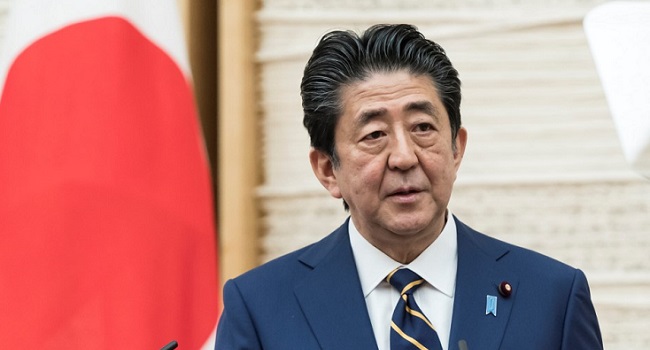Japan’s Prime Minister Shinzo Abe on Monday extended a state of emergency over the coronavirus until the end of May, warning it was too soon to begin relaxing restrictions.
But Abe said a review of the situation would be conducted in about two weeks, and the measures could be lifted before the end of the month if new infections slow sufficiently.
And he implied that there would be no further extension of the emergency, saying May would be when the country “presses towards the exit”.
“I must be candid and ask you to continue your efforts for some time,” Abe said at a press conference after announcing the extension.
“At this point, the decrease in people infected is still not at a sufficient level.”
Abe had declared a month-long state of emergency that initially covered Tokyo and six other regions on April 7, later expanding it to cover the entire country.
It had been due to expire on May 6, and Abe said the measures had reduced new infections from around 700 a day to a third of that.
READ ALSO: Germany Warns Coronavirus Vaccine Could Take ‘Years’
But he said the number of new cases was still outpacing the approximately 100 people discharged from hospital nationwide each day.
“We must decrease the number of newly infected people to below that level” to reduce pressure on the country’s healthcare system, he added.
Japan’s virus outbreak remains small compared with those seen in parts of Europe and the United States, with over 15,000 infections recorded and 510 deaths.
– Review in mid-May –
But the extension was backed by both experts advising the government and regional governors, with concerns that a sudden spike in cases remains possible.
The state of emergency falls far short of the harshest measures seen in parts of Europe and the United States. It allows local governors to urge people to stay at home and call on businesses to stay shut.
But officials cannot compel citizens to comply, and there are no punishments for those who fail to do so.
The government is calling on residents in 13 high-risk prefectures, including Japan’s biggest cities, to continue cutting person-to-person contact by 80 percent.
But museums, libraries and some other facilities will be able to reopen if they take anti-virus measures.
For the rest of Japan, prefectures will be allowed to loosen restrictions on business closures and small gatherings but residents will still be asked not to travel outside their home regions. Bars and nightclubs will be asked to remain shut.
It remains unclear when and whether schools — many of which have been closed since March — will be able to reopen, with officials recently suggesting a possible phased approach with certain key grades resuming before others.
– Healthcare under pressure –
Japan recorded its first coronavirus infection in mid-January, and came under early pressure with a mass outbreak on the Diamond Princess cruise ship docked off the city of Yokohama.
Despite so far avoiding the devastating tolls seen in places like Italy and New York, there have been persistent fears that Japan’s healthcare system could be quickly overwhelmed by a sudden spike in infections.
There are just five ICU beds per 100,000 people in Japan, less than half the number in Italy, and doctors’ associations have warned that hospitals are already stretched thin.
Measures have been implemented to try to ease the pressure, including sending coronavirus patients with mild symptoms to hotels for quarantine rather than keeping them in overcrowded hospitals.
The government has also said it is increasing testing capacity but continues to face criticism for the relatively low numbers of tests being carried out, in part because of stringent criteria.

